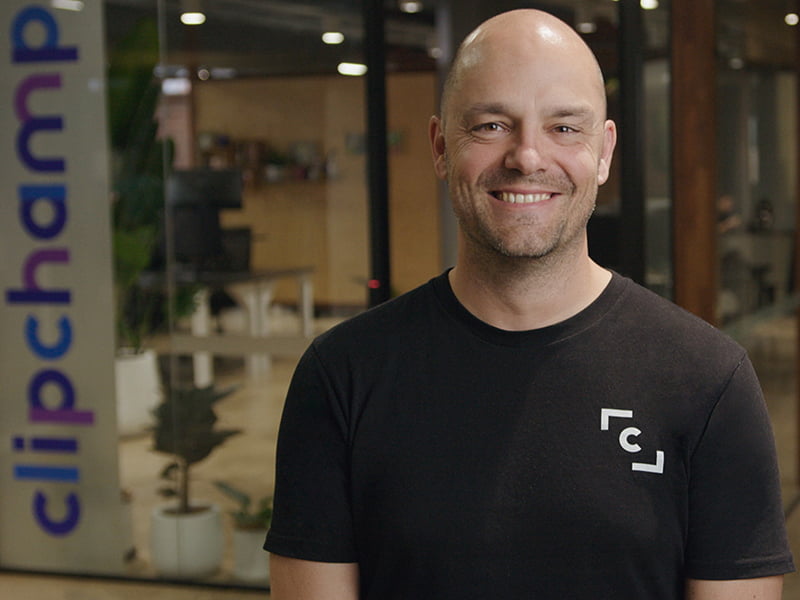A Brisbane-based online video-editing platform backed by prominent investor Steve Baxter and dubbed “Canva for video” has been acquired by tech giant Microsoft for an undisclosed amount.
Founded in 2013 by former SAP employees Alexander Dreiling, David Hewitt, Soeren Balko, and Tobias Raub, Clipchamp was created for non-creatives to put together videos that look professional, much in the same way Canva was originally created for those who weren’t savvy with complicated image-editing software.

The announcement of the acquisition comes as Microsoft looks to beef up its online productivity suite after announcing it would increase the cost of Office 365 business subscriptions next year.
It also comes after Adobe, the company behind image-editing tool Photoshop and popular video-editing program Premiere Pro, announced last month that it would acquire for $US1.275 billion ($A1.7b) video-editing program Frame.io, whose software allows customers to upload footage fast, comment directly on the clip, draw directly on the video, and compare versions side by side.
How much Microsoft paid for Clipchamp remains unknown, although it’s likely to be far greater than the $15.3 million the company raised since its inception eight years ago.
Also unclear is whether the deal will raise any competition issues with Australia’s competition regulator, which has recently been expressing concerns with tech giants gobbling up startups and weakening competition. The Australian Financial Review reported that the regulator, the ACCC, had only heard about the deal with Microsoft after it had been completed.
Clipchamp chief executive officer Mr Dreiling forwarded an InnovationAus request for interview to Microsoft’s Australian public relations firm Howarth, a representative of which said they were unable to offer interviews. However, the investor Mr Baxter said he would hold an “ask me anything” session with Mr Dreiling next Thursday on Zoom.
Mr Baxter said the acquisition was “a great outcome for everyone involved” and thanked investors who joined him in backing the company.
“Few companies in tech have the legacy and reach that Microsoft has,” Mr Dreiling said in a blog post announcing the acquisition. “We all grew up with iconic Microsoft products and have been using them ever since. Becoming part of Microsoft allows us to become part of a future legacy. Under no other scenario could our future look more exciting than what’s ahead of us now.
“At Clipchamp we have always said that we’re not suffering from a lack of opportunity, there absolutely is an abundance of opportunity in video. We just need to figure out how to seize it. Inside Microsoft we can approach seizing our opportunity in entirely new ways.”
Mr Dreiling also thanked supporters.
“There are so many people who have helped us on our journey: investors that invested in us when no one else would, employees that joined us when no one else knew us, journalists that wrote about us when no one else thought we were worth a story and partners in life that never stopped believing in us even when things got tough,” he said.
“They say that a startup journey is like a rollercoaster, the high points feel so much better than elsewhere, and the low points feel so much worse. No one understands this better than founders and their partners. Thank you to everyone who has supported us throughout all these years.”
LinkedIn lists about 92 current employees and in July the company said it had 17 million registered users on its platform across more than 390,000 companies, up 54 per cent year-on-year.
This year, it also found enormous pandemic-induced growth, with video exports skyrocketing 186 per cent year-on-year in the first half of 2021.
“This is a result of the pandemic-necessitated increase in remote work that required employees to create videos more frequently for activities that they would normally conduct in-person,” the company said in July, noting that it recorded the largest increases in usage for videos exported in the aspect ratios for TikTok and Instagram stories.
Locally, Clipchamp competes against companies like Hobart-founded Biteable, which has been around since 2015 and raised $US7 million ($9.4m) in a Series A funding round in December after an earlier raise of $2.8m in 2018. Canva, which is based in Sydney, also recently unveiled its own video-editing software.
“Clipchamp’s technical approach is to combine the simplicity of a web app with the ability to process video using the full computing power of a PC with graphics processing unit (GPU) acceleration, something that was formerly limited to traditional video applications,”
“As a web app that uses the full power of your PC, Clipchamp is a natural fit to extend the cloud-powered productivity experiences in Microsoft 365 for individuals, families, schools, and businesses. It’s also a great fit for Microsoft Windows, which is a platform for boundless creativity.”
Mr Pratley said Clipchamp’s template-driven, task-focused user experience gave people the confidence that they can create videos using its tool.
“Its rich library of filters, styles, transitions, and stock media combined with the power of a multi-track audio and video compositing editor gives everyone the fine control they need, and artistic help if they need it, to create exactly what they want, quickly and with confidence,” he said.
While it does video-editing today, Clipchamp wasn’t always intended to be video-editing focussed, with the founders telling StartupSmart that they originally set out to build a large distributed supercomputer. As part of that endeavour, they developed a video compression and conversion tool which later became part of Clipchamp when the supercomputer project didn’t work out.
In 2016, Clipchamp secured $1.1 million in funding, which included $499,120 from the federal government’s Accelerating Commercialisation grant program and from Path4 Group, Queensland University of Technology, and angel investors in Australia and Germany.
It later went on to raise $1 million from Brisbane venture capitalist Steve Baxter and a further $13.2 million in a Series A funding round led by US venture capitalist Tola Capital.
“We long believed that video creation and editing needed to be more accessible and easy to do and Clipchamp’s approach stood out to us as their Series A lead investor,” Aaron Fleishman, a partner at Tola Capital, said in LinkedIn on Wednesday.
Jez Corden, a writer for Windows Central, a blog focussed on all things Microsoft, remarked that Microsoft’s current video editing features “are truly abysmal”.
“I get better video editing tools on my Samsung phone right now, which is both hilarious and sad. Thankfully, this new partnership with Clipchamp may finally solve one of Windows’ biggest weaknesses in the social media age.”
The global video editing software market size is expected to reach $US1.1 billion ($1.4b) by 2025, according to market research and consulting company KBV Research.
Do you know more? Contact James Riley via Email.

